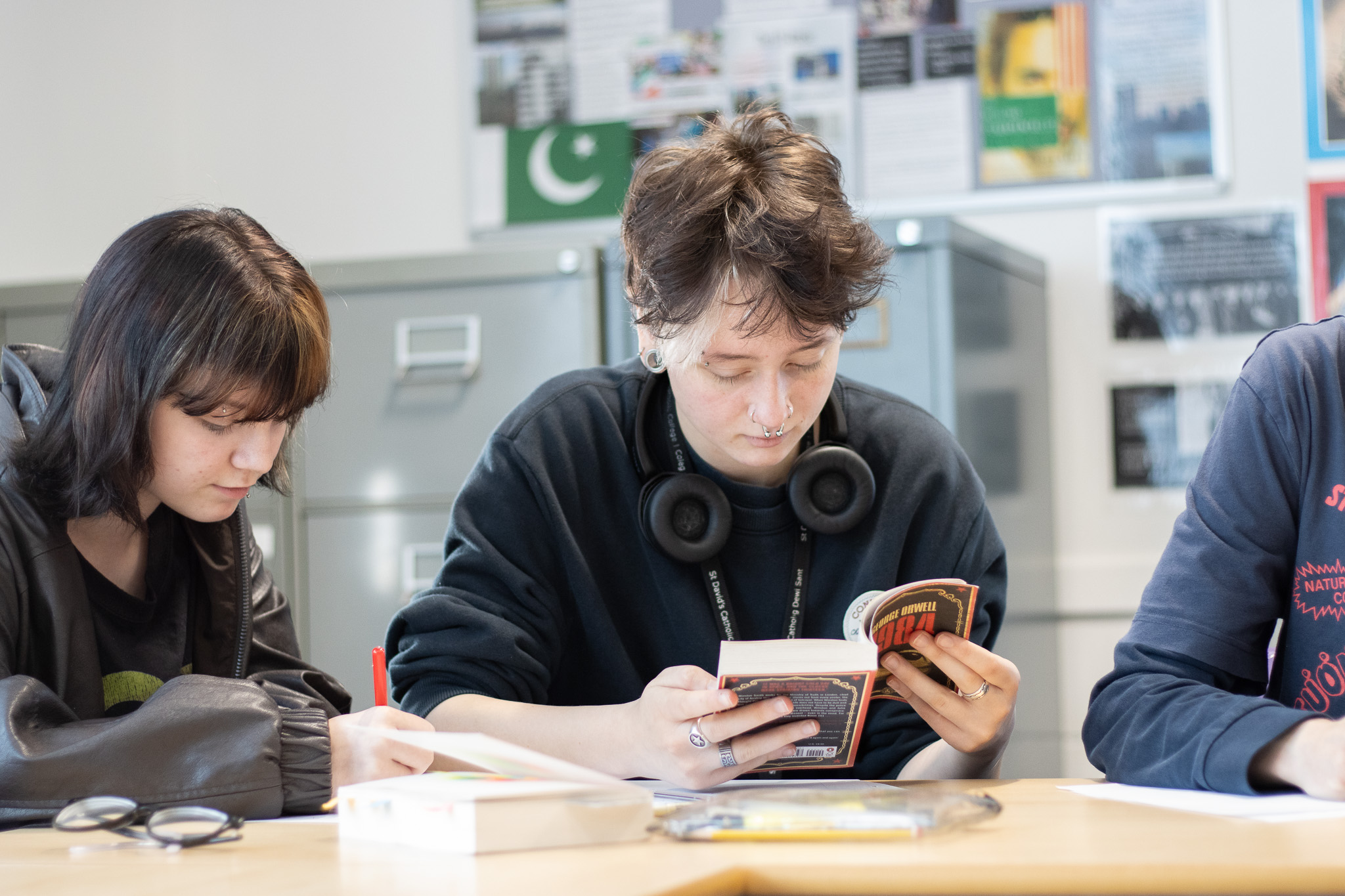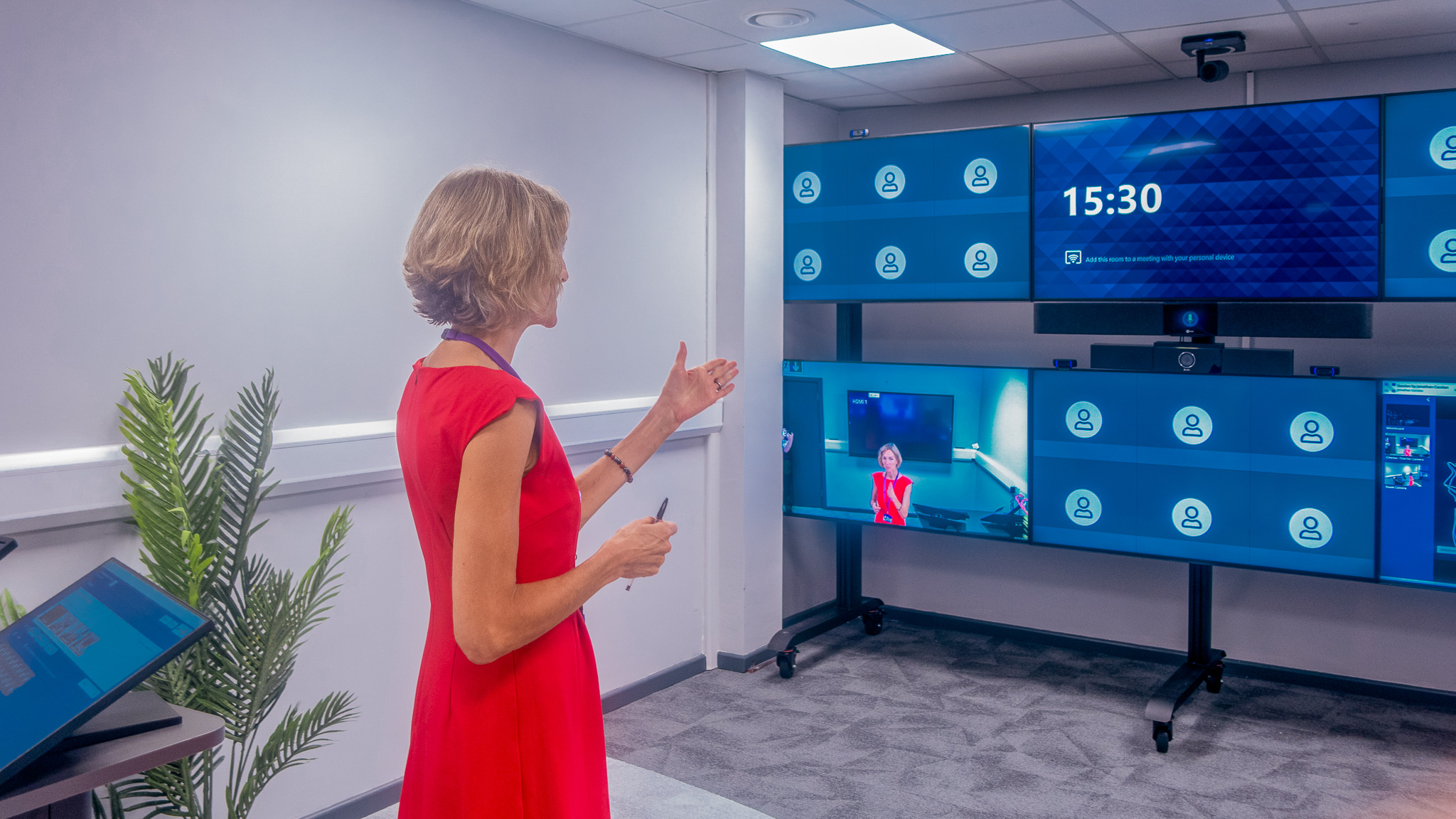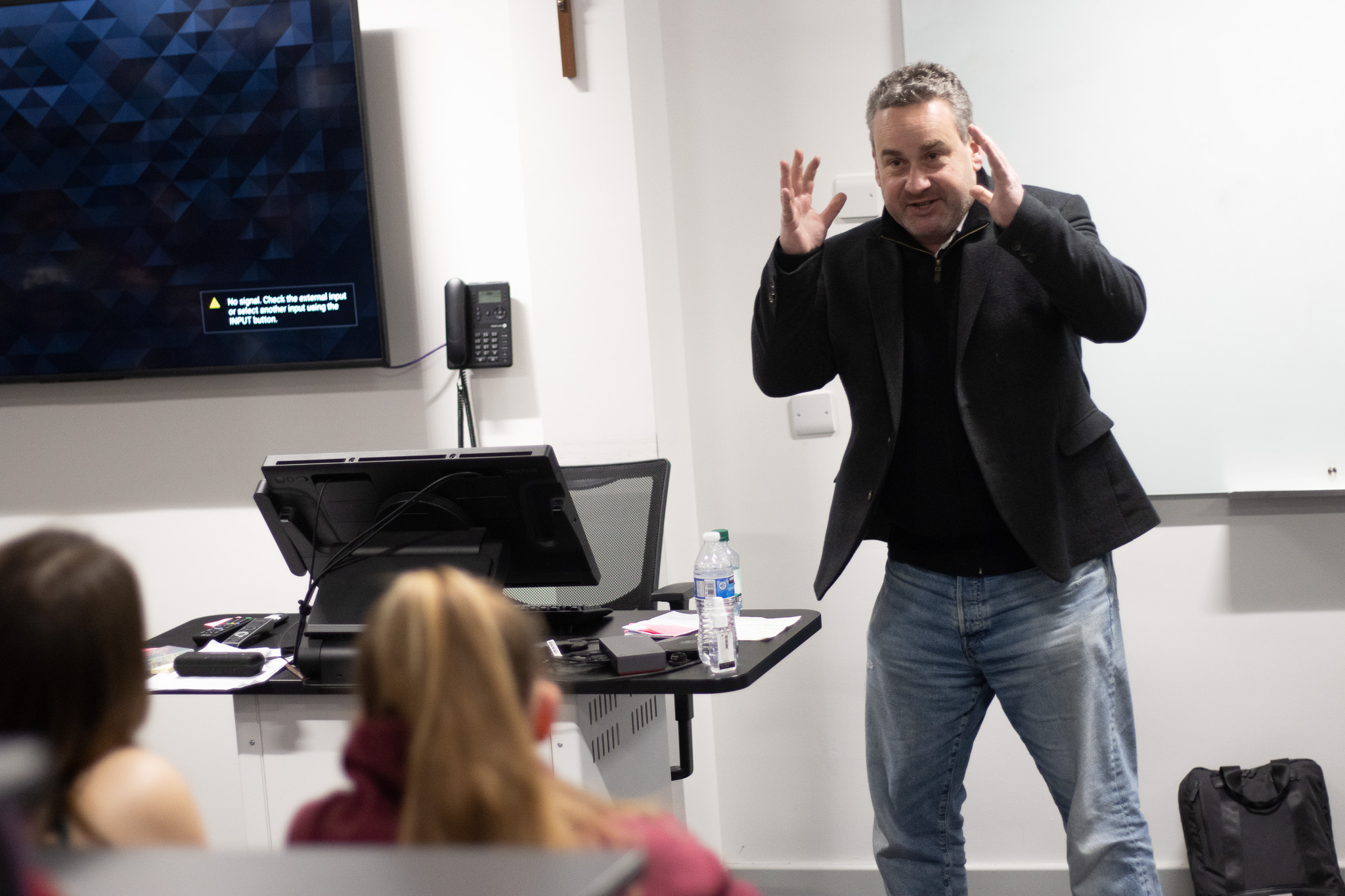You may be a keen scientist, a talented performer, a curious creative or looking to lead a Fortune 500 company. Whatever your chosen area of interest, St David’s College aims to provide you with a personalised programme of study that meets your learning needs and career aspirations.
The focus on education at St David’s College is on educating the whole person, enabling you to become an independent learner and facilitating a smooth transition from school to university or employment.
The information on this page details some of the support available in College, together with an overview of College life, what we expect from learners, and what you can expect in return.
Studying at College...
College life is different from school. You have more choice and more independence in what you study and how you study.
St David’s Catholic Sixth Form College provides an adult environment in which everyone can learn and progress. You are expected:
- to aspire to the highest levels of studentship by attending fully and punctually. Abide by the college term dates and not book holidays in term time;
- to come to lessons prepared to work including bringing a pen, file and any lesson resources you have been given. This includes specialist equipment as required by your
teachers; - to respect those around you by wearing appropriate and decent clothing. This involves removing hoods and baseball caps in lessons;
- to show respect to other users of the site and our neighbours, by conducting yourself in an adult manner, by not dropping litter, and by showing courtesy to local residents. In the area of Wellfield /Albany Road be mindful you are representing the College;
- to respect your fellow learners by not eating or drinking in class. Bottled water is permissible and is found to be beneficial to learning;
- to respect your health and that of others by not smoking or vaping on site. The College is a smoke free site;
- to respect your fellow learners by switching off all mobile phones and other devices in lessons. Place them in your bag and remove headphones.
Independent Study
In the morning you are not required to come to College until you have a lesson. However, throughout the day your timetable may include free periods for independent and private study. Please do not spend all this free time in the recreational areas but make use of the facilities for private study in the LRC and other areas of the College.

Types of Support
Please see the page for Transport, for details of transport to and from the College. You can also email the college if you have any transport-related queries or visit Student Services (in the George Stack entrance)
Email: studentservices@stdavidscollege.ac.uk
Phone: 02920 498555
The Wellbeing team offer a safe space & guidance to support emotional wellbeing and resilience. They have pods for quiet time, a sensory room, offer 1-2-1 sessions, lunchtime activity sessions, a counselling service, and can refer to specialist support agencies.
They are available in G17 (Main Building). There is no need to knock, you can just go in and see them.
Drop in between 8am to 4pm, Monday to Friday, at lunch, break, or when you have a free period.
You can also contact them to book an appointment by emailing:
wellbeing@stdavidscollege.ac.uk
For information on the financial support available to you, head to the finance page of this website by clicking here.
Each student is allocated a Progression Mentor in the autumn term of their upper sixth year. Progression Mentors are responsible for guiding you through the university admissions procedures, as well as ensuring that every student has access to appropriate careers guidance and support for apprenticeships and employment too.
Throughout the year, there will be multiple ‘fairs’ and talks, where external people come into College and allow you to explore the options available to you in the future. These opportunities allow you to make informed choices, so please take up every opportunity you can.
You can also visit The Launchpad, a bespoke team available to guide and support you with careers guidance, help with university course choices, and enterprise and employment opportunities.
Your pastoral tutor is there for you, to provide you with pastoral care and guidance.
You can go ahead and book an appointment with the College counsellor via your Pastoral Tutor.
If you are providing physical and emotional support and/or personal care to people in your household, including brothers and sisters, the College can support you.
Please contact Mrs C. Jones, who will be able to support you throughout your education.
Email: CJones@stdavidscollege.ac.uk
Exams are stressful; there’s no hiding from that, but we, as a community, will try to ensure that we are all prepared in the right ways.
You can find your personal exam timetable online, on Student Advantage, as soon as it becomes available. Individual exam clashes will be resolved.
Re-sit and Post-results Forms are available from Reception.
If you need information on any aspect of examinations or external assessment, please contact the exam officer, Mrs F. Jackson
Email: exams@stdavidscollege.ac.uk
All students at St David’s attend Spiritual Reflection, a course which entails a variety of discussions and activities. The course is designed to nurture in you the ability to think in broadly religious and spiritual terms, and contend with challenges presented by history, culture, politics, science and art, as well as developping the 16 key virtues of the Jesuit Pupil Profile
When you join St David’s, we assess your learning needs based on the information you share, ensuring you receive the proper support from the start.
If you have a learning need, exam access arrangements, or an Individual Development Plan (IDP), the Learner Support Centre (LSC) is here to help.
Our experienced staff are here to support learners in areas such as dyslexia, autism, ADHD, and general study skills needs, ensuring you have the tools and confidence to succeed.
For students who have previously attended Welsh-medium education, we recognise that the transition can be quite challenging.
When possible, you will be placed into a Welsh-medium tutor group where pastoral sessions are delivered bilingually.
Additional services and support available to students to help with the transition include:
- bilingual terminology booklets, per subject
- help with writing assignments
- organising Welsh medium work experience
- a wide variety of extra-curricular experiences
- opportunity to be part of St David’s Bilingual Committee.
The College supports opportunities for all learners to develop their Welsh language skills.
To succeed in college, students must demonstrate good levels of literacy and numeracy.
Your subject teachers will provide you with specific support on how to improve your skills in these areas – and your pastoral tutor will give more support.
Pastoral Tutor
Your Pastoral Tutor is your go-to person for help and support. They are there to guide you through life at St David’s.
You will see your Pastoral Tutor once a week, but can contact them at any point in the College day.

Safeguarding and Wellbeing
Everyone has the right to feel safe in College, and everyone has a responsibility to make sure that those around us are safe too. You can always contact a member of the Safeguarding team if you have any concerns, or speak with a teacher or member of Wellbeing.

The Launchpad
The Launchpad is the go-to hub for everything related to life after College. They can provide support with careers, university choices, courses, UCAS support, employability, part-time jobs, volunteering – the list goes on!
The opportunities that the Launchpad staff provide learners are there to be taken – they are really beneficial for university applications, CVs and job applications – as well as expanding your views and making better decisions regarding your future.

Progressing to Year 2
Students studying Level 2 or Level 3 courses are not automatically entitled to a second year at the College. Your place in the second year relies on your studentship in the first year. You will have to demonstrate your commitment to study to your teachers and pastoral tutor.
To progress to Year 2 of a Level 3 course, you must achieve a Grade D in an AS Level subject or a Pass in BTEC courses. In Double Mathematics, a Grade C must be achieved in A Level Mathematics, including a C in each module.
Attendance provides the clearest indication of success, with research showing that a 10% drop in attendance accounts for a one grade drop at A Level. Therefore, a student with an attendance rate of around 75% will perform on average two grades below those with an attendance rate of 95%.
At a time when entry to university and employment are competitive, students significantly affect their future life changes if attendance falls below 95%.
To frame this in another way, a student with 75% attendance misses the equivalent of 8 weeks of teaching over the year. This is vital contact time with a teacher, which would mean the inability to answer whole sections of an exam paper.
You are expected to
- aim for 100% attendance.
- ensure any absense is reported to your pastoral tutor and authorised by your parent or guardian online.
The College conducts a formal attendance monitoring system, whereby students will be accountable for unauthorised or unexplained absences.
Learners with poor attendance will be placed on a studentship plan, which could ultimately result in you being asked to leave the College should you be unable to turn things around successfully.
You must contact your pastoral tutor by telephone or email to let them know if you are away for any reason on the first day of your absence.
This is both courteous and good practice. All absences need to be authorised by your parent or guardian online.
Punctuality is a desirable and transferable skill for the workplace. If you know you are going to be late, you should contact your pastoral tutor and teacher in advance.
Persistent lateness will be viewed as a lack of commitment to your education and will be addressed as a studentship issue.
Any type of harassent, whether physical, verbal, non-verbal, sexual or racial will not be tolerated. Disciplinary action will be taken against any member of the community found to be guilty of such behaviour.
The College recognises the significance of ensuring the safety and security of all learners, the College community and their belongings. We have a comprehensive Safeguarding Procedure.
If you have any concerns or questions about your safety, well-being, or that of another learner, including concerns about radicalisation, please contact your pastoral tutor. If your pastoral tutor is unavailable or you would prefer not to discuss the matter with them, then contact the Safeguarding Manager in the Wellbeing office.
There is also a ‘Report It’ button on Linc, that goes directly to the Safeguarding team.
Any student suspected of possessing or using illegal substances will be suspended pending a College Disciplinary Hearing.
If a student is found to have been involved, they will be asked to leave the College, and the Police will be informed of the student’s exclusion.
Plagiarism is the presentation of anybody else’s thoughts, words and ideas as your own work, including the use of AI.
Any student found to have plagiarised or copied from another student may be asked to leave the course or be excluded from the College.
The College is required to report all instances of plagiarism to the examination board and awarding bodies.
Mobile phones should be switched off in lessons, unless a teacher specifically allows you to use your phone as part of a learning activity.
If you are a young carer or may need to have your phone on for personal or family reasons, speak to your teacher in advance.
You are strongly discouraged from taking a holiday during term time, as it will be recorded as an ‘unauthorised absence’ and may result in possible disciplinary action.
Term dates are published in advance of the academic year. Please ensure that you don’t take holidays during term time.
2025-2026 Term Dates
Start of Term: 8th September
Half Term: 27th October – 31st October
Christmas Break: 22nd December – 2nd January 2026
Half Term: 16th February – 20th February
Easter Break: 30th March – 10th April
Half Term: 25th May – 29th May
End of Term: June 26th





